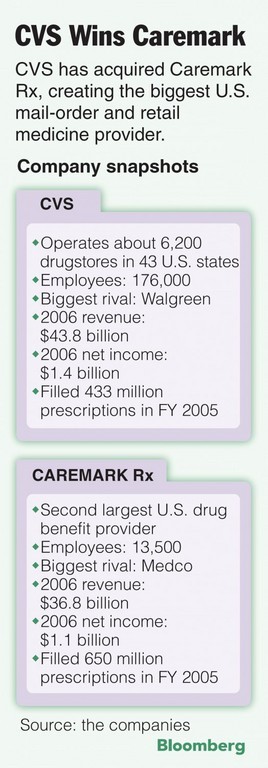Shareholders of Caremark Rx Inc., the second-largest U.S. drug-benefits manager, approved the $27 billion acquisition by pharmacy chain CVS Corp. on March 16 at a meeting in Nashville, Tenn., ending a process that started with the Nov. 1 announcement of the deal. The merger creates the largest combined mail-order and retail medicine provider, and it follows five months of often acrimonious public discussion by shareholder rights groups and other market observers.
With the vote, Caremark shareholders chose CVS over a $27.5 billion takeover offer from Express Scripts Inc. CVS shareholders had approved the purchase March 15, and the transaction closed early last Thursday.
The “vote reinforces the compelling logic underpinning the merger,” Tom Ryan, then chairman, president and CEO of CVS, and now president and CEO of CVS/Caremark, had said in a statement after the Caremark vote. “We have said from the beginning that this combination … [will enable] consumers to benefit from enhanced health care services and improved outcomes.”
The combination of CVS and Caremark will operate under the name CVS/Caremark Corp. It is expected to be more competitive with Wal-Mart Stores Inc.’s 3,850 pharmacies, which offer discounted prices on generic drugs. The acquisition also will give CVS more clout in negotiating prices with drug makers. It may stem a decline in visits to stores as customers have turned to home delivery by companies like Caremark.
“The merger between CVS and Caremark is a revolutionary event within the health care delivery network that should benefit payers, customers and shareholders alike,” said William Dreher, an analyst with Deutsche Bank in New York, in a note to clients.
The combined company will be based in Woonsocket, the home of CVS. As an operator of drugstores, CVS, with 6,200 locations and revenue of $43.8 billion, ranks behind Walgreen Co., with more than 5,600 stores and revenue of $47.4 billion.
Caremark shareholders will get 1.67 CVS shares and a $7.50 special one-time dividend for each of their shares. Based on the price the day before the merger vote, the deal was valued at $61.68 a share.
Express Scripts bid $29.25 in cash and 0.426 of an Express Scripts share for each Caremark share, valued at $64.36 based on the share price the day before the vote. That transaction would not have closed before September, Express Scripts said. U.S. antitrust regulators delayed approval of the Express Scripts bid earlier this month. Express Scripts declined to raise its offer this week.
“This changes the marketplace,” said Mac Crawford, chairman of CVS/Caremark and previously Caremark’s chief executive officer, after the shareholder meeting in Nashville. “CVS has 5 million people a day walking into their pharmacies, but they do not have the contacts for people paying the bills. You now put together an organization that has both sides of it.”
Employers hire Caremark to keep costs down by seeking out drug manufacturers and pharmacies with the best prices. Health insurance plans and employers are turning to such companies to help counter rising drug costs. U.S. spending on prescription rose 5.4 percent to $251.8 billion in 2005. The companies lower costs for health plans and employers by buying in bulk, minimizing waste in the handling of expensive biotechnology drugs and promoting generics.
Wal-Mart, responding in part to the national debate over the affordability of medicine, said in September that would charge as little as $4 for a month’s supply of more than 300 generic drugs.
CVS’ purchase of Caremark “has the potential to get more patients to refill more prescriptions and bring in more revenue,” said Matt Kaufler, who manages $2.6 billion, including CVS shares, for Clover Capital Management in Rochester, N.Y., in a telephone interview. “Right now, every patient who doesn’t get refills is a lost revenue opportunity.”
Caremark and its competitors have been taking advantage of a flood of generic copies of brand-name drugs, such as Merck & Co.’s Zocor. Pharmacy-benefit managers can switch most of their mail-order customers from high-priced brands to low-cost generics in a matter of days or weeks.
Medco Health Solutions Inc., the biggest manager of employee prescription drug benefits by sales, bought specialty pharmacy provider Accredo Health Inc. last year, while Express Scripts, the third-biggest, acquired CuraScript Pharmacy Inc. in 2004 and Priority Healthcare Inc. last year.
No posts to display
Sign in
Welcome! Log into your account
Forgot your password? Get help
Privacy Policy
Password recovery
Recover your password
A password will be e-mailed to you.













